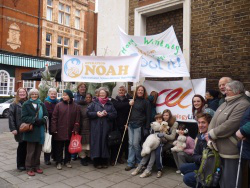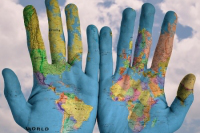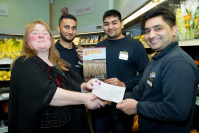Climate Service Talk: Transforming the Prodigal Civilisation

Campaigners after service with polar bears
The following talk was given by Ellen Teague at the annual Climate Service in Central London on Saturday, 1 December 2012. It was held in advance of a march from the US Embassy in Grosvenor Square to Westminster calling for tough climate action at climate talks being held at Doha. The talk was based around the reading 1 Peter 3 v12–16 and a reflection on ‘The Prodigal Civilisation’.
Put up your hands if you attended The Wave in December 2009. (80% of congregation)
Hands up if you’ve been to this annual service more than three times. (40%)
Keep them up if you’ve been to all the annual climate services. (Ellen Teague and Ruth Jarman)
I think that’s why I’m up here speaking to you. I just can’t keep away from events organised by Christian Ecology Link and Operation Noah! I believe their prophetic and wonderfully ecumenical work truly builds on God’s covenant with the whole of Creation.
Yet on the whole, for mainstream churches, Climate Change is just one of a number of pressing issues. It gets peaks of serious attention – such as The Wave – where church leaders across the denominations supported the service and march, their presence drawing in tens of thousands of Christians. But then it’s back burner again, and there is no sense that Climate Change – perhaps along with the huge extinction of species – is the most serious emergency the human race has ever faced. I was persuaded of this 30 years ago while working in Northern Nigeria and being told by an old man that over his lifetime he had seen a forested region where he plucked fruit from the trees daily and hunted plentiful wild animals turn into a treeless dusty plain with a diminishing rainy season; 27 years ago while working on CAFOD’s Development and Environment Education campaign which was rooted in the 1984 Ethiopia famine where poor communities struggled to survive amidst a degraded and waterless environment; and for the past 22 years working for the Columban Missionary Society which recognises Climate Change as a challenge to move into a new and prophetic way of being missionaries that includes protecting the endangered Earth. As my Columban colleague Sean McDonagh says, “we are Earthlings and this is our only home”.
Many in this congregation have made it their life’s work to nurture appreciation of the natural world, and to tackle fear and denial regarding Climate Change. Society has moved a long way over the last three decades. Just look at the stories on mainstream media this week - Welsh Secretary of State David Jones saying that people affected by floods at St Asaph could be the victims of Climate Change, scientists underlining that polar ice melt is raising sea levels, the World Bank saying that “cooperative, international actions are necessary to avert extreme weather and declining food stocks”. This last though is a bit rich coming from an institution that is providing billions for schemes that contribute to global warming, particularly the fossil fuel industries, and especially coal!
But here is the crux of the problem. Living within the carbon budget that the scientific community has set is a difficult paradigm shift for economists and politicians working within the prevailing economic growth model. Or indeed for climate negotiators at the highest level who have strong links to the fossil fuel industries. UN climate talks are currently going on in Qatar. Are negotiators likely to agree that, for a 50-50 chance of staying below two degrees of warming, we have to leave 2/3 of the known reserves of coal and oil and gas underground – a figure incidentally produced last month by the International Energy Agency? Not really. Yet the clamour for climate action at a profound level is strengthening. I clicked on the latest series of Dallas on TV a few days ago and saw the next generation of Ewings sitting around a table at Southfork ranch discussing the future of the oil business in Texas. “You’d better realise it, the oil industry has had its day”, one of the young characters told JR’s son, who then stormed out, provoking the latest cliffhanger. Questions are now constantly raised about the prevailing model of development which is at the heart of the Climate Change problem, whatever you hear about it being an environmental problem.
The reading we have just heard from Peter challenges us to speak the truth to a prodigal civilisation, one that is wastefully extravagant and seemingly uncaring about the welfare of future generations. Creation theologian Thomas Berry talks about the supreme irony – that we are closing down life systems as the result of a commitment to progress. Yet even as we wake up to the risks we carry on. I am thinking here of the building of a nuclear military base on the biodiverse paradise that is Jeju island in Korea, or considering new nuclear power stations in Britain although we still have no secure procedure for dealing with wastes that are lethal for tens of thousands of years. My Columban colleagues and myself are involved in campaigns challenging both. Berry suggests that the religious communities have a role in drawing on redemptive energies to turn things around. Our task has developed into one of stimulating the transformation necessary for human society to opt for sustainable
development within the constraints of Earth’s natural systems.
Well, as Christians we believe in miracles. But we also believe in hope, the kind of hope that doesn’t wait for miracles but makes change happen. I love this quote from the Liberation Theologian Gustavo Gutierrez – “Hope is a gift, but you do not receive that gift if you are not creating resources for it. Reasons for hope don’t just drop from the sky. They come from below, from what people are doing or not doing.”
And in terms of addressing Climate Change that means us – the communities of Christian Ecology Link and Operation Noah. I’m afraid, my own Catholic Church and others are still too patriarchal in their set up to be the leading players, but they may follow where the grassroots leads.
Let me make a few comments.
Firstly, thank you to the leading players in Christian Ecology Link and Operation Noah – my valued friends - for moving us on from democracy to biocracy – where the community of life on Earth features in our human decision-making processes. For you, serving the common good gets priority ahead of financial remuneration - all the quiet hours of work planning events, running excellent websites, and producing inspirational documents like the Ash Wednesday Declaration are greatly appreciated.
Secondly, could I entreat the big Christian development agencies to underline the seriousness of Climate Change in all their work, even if it means sounding less upbeat about their impact on poverty. Climate Change is more than one issue among many, and it links into all other areas of development work. For example, today is World Aids Day. A UN paper produced earlier this year pointed out that Climate Change is likely to raise the vulnerability of populations with already high rates of HIV, mostly in sub-Saharan Africa. People with immune systems weakened by HIV are at greater risk of malaria and other infectious diseases sensitive to climate change. In their new Food campaigns the development agencies must not underplay the hugely negative impact that Climate Change is going to have on food security. Yet these agencies have had a growing “ecological conversion” over the years. CAFOD, for example, has been a key player in setting up the Live Simply Parish Award for Catholic parishes, helping them to live simply, sustainably and in solidarity with the poor. I was an assessor for the first Catholic Parish to be given the award three months ago - St John Bosco in Reading – and was so impressed by the installation of solar panels on the roof, an annual liturgy to appreciate God’s Creation and advocacy on Climate Change.
Thirdly, Christian media could do much more to raise awareness about Faith and Climate Change, prodding readers to take Climate Change more seriously. If the latest issue of my son’s Institute of Engineering and Technology magazine can give more than 30 pages to this, why can’t it get more than a few slight paragraphs of coverage in much of the Christian press and radio.
Fourthly, let us continue to work with allies wherever we can find them: with environmental agencies working on decarbonisation targets in the Energy Bill that will help push us towards renewables and the creation of green jobs. Congratulations to the Methodists, Baptists, United Reformed Churches and Quakers who have produced a paper challenging the Energy Bill in its current form. Operation Noah has done the same, saying that “avoiding our duty to substantially reduce emissions is immoral”. Let us engage with peace groups challenging likely expenditure of £70 billion on renewing our Trident nuclear weapons systems, and exploring new notions of security in the 21st century. With the Insurance Industry which has largely identified nuclear power as so dangerous that it is uninsurable. Let’s engage more with ethical investment groups. Churches could withdraw investment from fossil fuel companies – the Church of England has significant investments in Shell and BP - and put it into green companies. And what about the young people at the march later on today highlighting concerns about the keystone pipeline and fracking – let’s support their initiatives and share their vision for a sustainable future.
Hurricane Sandy (the diminutive for Cassandra) should be a major wake-up call for the United States and for us as we have witnessed exceptional flooding this week, but we may reflect that Cassandra was not heeded when she foretold the downfall of Troy. Of course, we are no longer looking to the future. The impacts of human-induced Climate Change are already here, but the prodigal civilisation still has a window of opportunity to repent. It’s not easy. For me, I’ve been uneasy about frightening my own children and inducing Climate Change fatigue in others. I also love my gadgets and transport that ease modern life. We celebrate today that Christian Climate activists continue to work for that transformation which will help human society make peace with the planet and with God the Creator.
Hands up those of who will dedicate ourselves to this mission of Hope in the future.
(All hands up.)
For more information see: www.operationnoah.org and


















